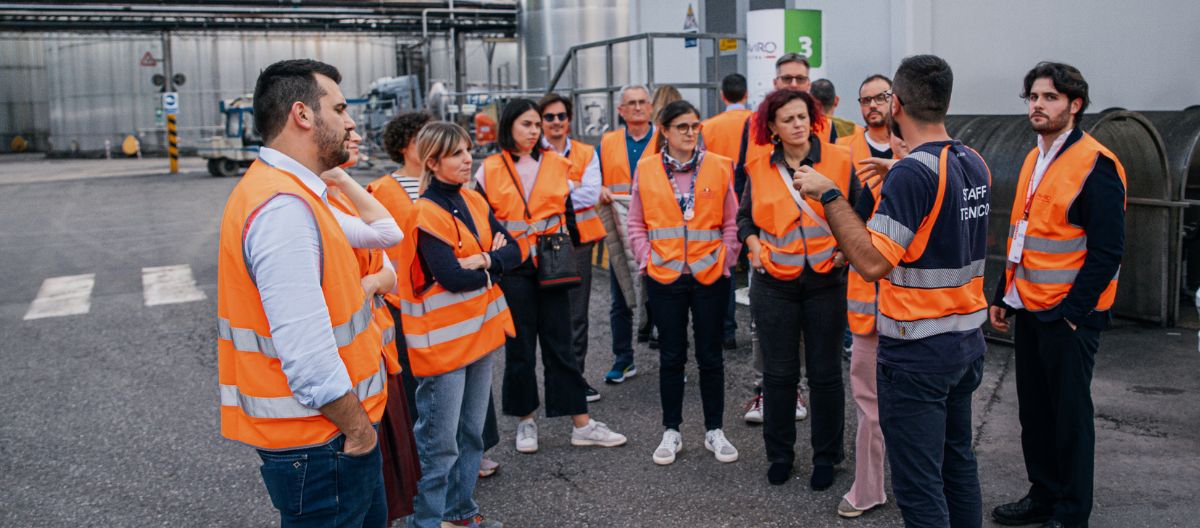
Journey into the Circular Economy: The Company Visit of the Master in Sustainability and Business Innovation at Caviro Extra
5 November 2024The participants of the Executive Master in Sustainability and Business Innovation at Bologna Business School entered the gates of one of the most interesting examples of the circular economy in Italy. The sustainability managers visited Caviro Extra, a key Italian company representing a model of circular economy in the agro-industrial sector. It was a day that not only offered participants the opportunity to explore a leading company in sustainable resource management but also allowed them to delve into key topics related to sustainable finance. We asked Cristina Tonini, Sustainability Manager at Philip Morris International, and Michele Castellari, an engineer and Certified Energy Management Expert at CUBE s.r.l., both Master participants, to share some of their impressions about this visit.
An Introduction to Sustainable Finance
The day began at Villa Guastavillani, the historic headquarters of Bologna Business School, where the participants attended a lecture given by Barbara Petracci on sustainable finance. The professor explored how companies can adopt responsible and sustainable financial strategies by integrating environmental, social, and governance (ESG) principles into their economic decisions. The goal was to provide students with the tools to understand how finance can be a fundamental lever for fostering ecological transition, a core topic within the program.
The Visit to Caviro Extra: Innovation and Circularity
After the lecture, the day continued with a visit to Caviro Extra. Founded with the goal of enhancing the by-products of the wine supply chain, Caviro Extra is now an outstanding company that transforms agricultural waste into valuable resources, such as biofuels and other sustainable products.
The students were welcomed for a complete tour of the facility, where they had the opportunity to observe the innovative transformation technologies and understand how the company achieves a virtuous cycle of material reuse. Caviro Extra’s commitment to sustainability is evident in its cutting-edge solutions for renewable energy production and its ability to minimize waste, reinforcing the importance of the circular economy in the future of industry. An approach that impressed participants.“The process that impressed me most during the visit to Caviro Extra was certainly the extraordinary ability of the company to transform a by-product of their core business into a valuable element to be enhanced and profited from. Equally exceptional was their skill in integrating into this business model the vegetable by-products of other supply chains, turning them into added value,” said Cristina Tonini. Castellari added, “Caviro Extra’s approach is based on a radical choice: waste nothing, because everything organic can become a resource. Thanks to this conviction, they have created innovative solutions that benefit the entire supply chain. I believe this approach could be applied to all industrial sectors: we need to start innovating to transform what we waste into a resource.”
A Practical Experience for the Future of Sustainability
The company visit to Caviro Extra provided a valuable learning opportunity for participants of the Master in Sustainability and Business Innovation. This program is designed for professionals who seek to develop advanced skills to integrate innovation and sustainability into business strategies. With an interdisciplinary approach that combines business management, innovative technologies, and sustainable practices, the program aims to shape leaders capable of guiding organizations towards a greener future, ready to tackle the challenges of climate change and responsible innovation.
A Bridge Between Theory and Practice
Thanks to days like this, students have the opportunity to integrate theory with practice, coming into direct contact with successful companies and understanding how sustainability strategies can be implemented in real-world business contexts. The collaboration between Bologna Business School and leading companies like Caviro Extra adds significant value to the students’ educational journey, providing them with a concrete understanding of the challenges and opportunities related to sustainability. “Experiences like this allow us, on one hand, to experience firsthand companies that have truly managed to innovate, and on the other, to create opportunities for dialogue and networking with industry experts who, in addition to their strong expertise, share a deep commitment to sustainability that inspires us to work in this field,” concluded Castellari.
Tonini also highlighted the value of cross-sector collaboration: “Caviro Extra’s approach can be an inspiration for many industrial models. The application of the concept of circular economy and cross-sector collaboration are best practices that can be adopted by many supply chains, which can benefit from them in various ways. Firstly, from an economic point of view, as waste is transformed into a valuable raw material. Secondly, from a reputational point of view, as the company demonstrates the implementation of efficient measures to support sustainability, indirectly fostering a culture of sustainability among people and in society.”
